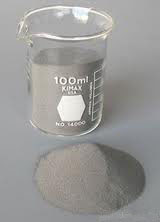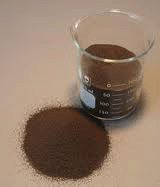Iron is a metallic chemical element with the symbol Fe (Latin: ferrum) and atomic number 26. Iron is a group 8 and period 4 element and is therefore classified as a transition metal. Iron and iron alloys (steels) are by far the most common metals and the most common ferromagnetic materials in everyday use. Fresh iron surfaces are lustrous and silvery-grey in color, but oxidize in air to form a red or brown coating of ferric oxide or rust. Pure single crystals of iron are soft (softer than aluminium), and the addition of minute amounts of impurities, such as carbon, significantly strengthens them. Alloying iron with appropriate small amounts (up to a few percent) of other metals and carbon produces steel, which can be 1,000 times harder than pure iron.
Iron-56 is the heaviest stable isotope produced by the alpha process in stellar nucleosynthesis; heavier elements than iron and nickel require a supernova for their formation. Iron is the most abundant element in the core of red giants, and is the most abundant metal in iron meteorites and in the dense metal cores of planets such as Earth.
 Iron powder is produced in many different grades for varieties of applications. We can help you select the best iron powder for your specific application. In case the iron powder you need is not a stock item, we will be glad to supply it based on the specifications you require. Iron powder is produced in many different grades for varieties of applications. We can help you select the best iron powder for your specific application. In case the iron powder you need is not a stock item, we will be glad to supply it based on the specifications you require.
High purity fine iron powders are used to manufacture sintered components, soft magnetic components, brazing, iron fortification, friction products, printing, surface coating, welding, chemistry and polymer filtrations.
The most common iron powders for msny of the above applications are high purity 100 mesh iron powders. This is a very fine iron powder containing particles as small as 325 mesh. This is also the most cost effective product for many applications.
 For very special applications we can supply other mesh sizes as required.We also offer cast iron powder with 90% metallic iron and small amounts of iron oxide, carbon, silicon, chromium and manganese. Cast iron powder is used in the manufacturing of specialty alloys and as an ingredient in pyrotechnic mixtures. For very special applications we can supply other mesh sizes as required.We also offer cast iron powder with 90% metallic iron and small amounts of iron oxide, carbon, silicon, chromium and manganese. Cast iron powder is used in the manufacturing of specialty alloys and as an ingredient in pyrotechnic mixtures.
Other applications of the cast iron powder include production of iron chemical compounds such as Iron Sulfate, additive for animal food.
Cast iron powder has a brownish color due to the presence of iron oxides.
The chemical standard of the reduce iron powder( %)
FHT40.35 |
98.50 |
0.020 |
0.020 |
0.120 |
0.400 |
0.020 |
0.350 |
0.350 |
FHT60.28 |
98.50 |
0.020 |
0.020 |
0.120 |
0.400 |
0.020 |
0.350 |
0.350 |
FHY100.25 |
99.00 |
0.010 |
0.010 |
0.100 |
0.350 |
0.020 |
0.300 |
0.400 |
FHY100.27 |
99.00 |
0.010 |
0.010 |
0.100 |
0.350 |
0.020 |
0.300 |
0.400 |
FHY150.27 |
98.50 |
0.020 |
0.020 |
0.120 |
0.400 |
0.020 |
0.300 |
0.400 |
FHY200 |
98.50 |
0.020 |
0.020 |
0.120 |
0.400 |
0.020 |
0.300 |
0.500 |
FHY300 |
98.00 |
0.020 |
0.020 |
0.120 |
0.400 |
0.020 |
0.450 |
0.500 |
FHY400 |
98.00 |
0.020 |
0.020 |
0.120 |
0.400 |
0.020 |
0.500 |
0.500 |
If you have any interest in iron powder, please feel free to contact us by email: sales@chinatungsten.com or by telephone:+86 592 5129696.
More info>>
Tungsten Powder |







